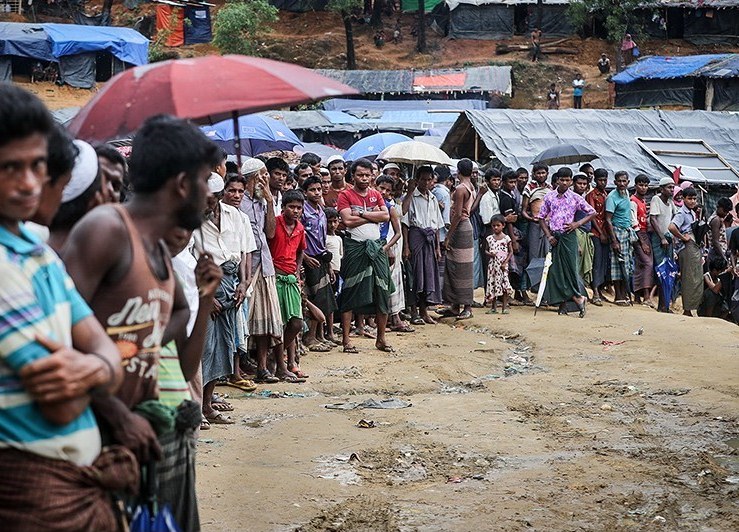World
Rights Group Urges Caution on Rohingya Repatriation Plans

Amnesty International has issued a stark warning regarding the potential repatriation of Rohingya refugees from Bangladesh to Myanmar, describing the situation as “dangerously premature.” The rights organization highlighted that returning under current circumstances in northern Rakhine State could lead to catastrophic outcomes for the Rohingya, who have suffered from systematic persecution.
The Rohingya, a predominantly Muslim ethnic group, have faced severe human rights abuses, prompting over 1.2 million individuals to flee to Bangladesh since a military campaign in 2016-2017 was deemed by the United Nations as a “textbook example of ethnic cleansing.” As the UN General Assembly prepares to discuss the plight of the Rohingya and other minorities in Myanmar on October 3, 2023, concerns continue to mount over their safety upon return.
Harsh Conditions Awaiting Returnees
Amnesty International’s researcher, Joe Freeman, emphasized that the current conditions in northern Rakhine State do not support a safe return for the Rohingya. He stated, “The Arakan Army has, to many Rohingya, replaced the Myanmar military as their oppressor.” Reports indicate that the military is using Rohingya civilians in combat against the Arakan Army, while armed groups are increasingly launching attacks in the region.
The humanitarian crisis has been exacerbated by a significant reduction in US aid, leading to skyrocketing prices and dwindling supplies. Freeman further warned that any attempt to expedite repatriation without addressing the urgent dangers faced by all communities in the region, including the Rohingya and Rakhine populations, could have dire consequences.
International Attention and Ongoing Violations
The Arakan Army, which has gained control over much of northern Rakhine since 2024, disputes allegations of forced labor and discriminatory practices. The group claims such measures are necessary for community security amid ongoing conflict and insists that any work assignments apply equally to the Rakhine population. Despite these assertions, Amnesty International maintains that the situation for the Rohingya remains precarious under Arakan Army control, with both the Myanmar military and the Arakan Army committing abuses that violate international humanitarian law.
Other rights organizations, such as Human Rights Watch (HRW), have echoed Amnesty’s concerns, stating that any repatriation efforts lacking robust rights protections would be unacceptable. HRW has also criticized the Arakan Army for its human rights abuses against the Rohingya.
As the humanitarian crisis continues to unfold, the international community’s focus on the Rohingya remains vital. Advocates stress that without addressing the underlying issues and ensuring the protection of all affected communities, any push for repatriation will likely lead to further suffering and instability.
-

 Lifestyle5 months ago
Lifestyle5 months agoLibraries Challenge Rising E-Book Costs Amid Growing Demand
-

 Sports4 months ago
Sports4 months agoTyreek Hill Responds to Tua Tagovailoa’s Comments on Team Dynamics
-

 Sports4 months ago
Sports4 months agoLiverpool Secures Agreement to Sign Young Striker Will Wright
-

 Lifestyle4 months ago
Lifestyle4 months agoSave Your Split Tomatoes: Expert Tips for Gardeners
-

 Lifestyle4 months ago
Lifestyle4 months agoPrincess Beatrice’s Daughter Athena Joins Siblings at London Parade
-

 Science4 months ago
Science4 months agoSan Francisco Hosts Unique Contest to Identify “Performative Males”
-

 World4 months ago
World4 months agoWinter Storms Lash New South Wales with Snow, Flood Risks
-

 Science5 months ago
Science5 months agoTrump Administration Moves to Repeal Key Climate Regulation
-

 Business5 months ago
Business5 months agoSoFi Technologies Shares Slip 2% Following Insider Stock Sale
-

 Science5 months ago
Science5 months agoNew Tool Reveals Link Between Horse Coat Condition and Parasites
-

 Sports4 months ago
Sports4 months agoElon Musk Sculpture Travels From Utah to Yosemite National Park
-

 Science5 months ago
Science5 months agoNew Study Confirms Humans Transported Stonehenge Bluestones









